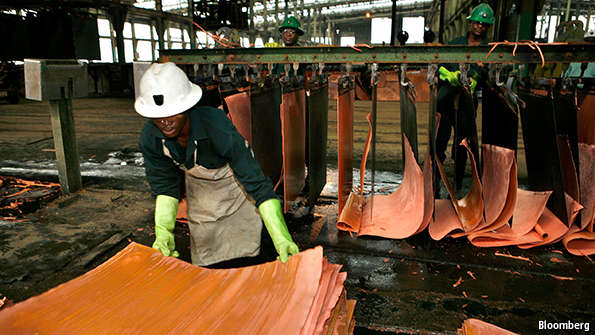Glencore and commodity traders
Nowhere to hide
Glencore’s woes put the spotlight on an industry unused to scrutiny
. .

Not such a copper-bottomed investment
SWITZERLAND is famous for the inscrutability of its banks. Its commodity-trading houses, middlemen for more than a third of the world’s oil and half of its coffee, are also about as murky as a mug of Nescafé. So when Glencore, once the epitome of a secretive trading firm, launched the biggest share offering in the history of the London Stock Exchange, in 2011, the crucial question was how it would handle the pressures of being a public company. On September 7th it gave an answer, of sorts. After a dismal share-price performance this year, it caught shareholders by surprise, by announcing a $2.5 billion share issue and suspending the dividend. Although such moves normally send a company’s shares crashing, Glencore’s rose in reaction, out of relief that it was taking action to restore its battered finances.
The main cause of the firm’s woes is its ill-timed reacquisition in 2013 of Xstrata, an Anglo-Swiss mining firm it had once spun off. That catapulted it into the mining big leagues just as slowing Chinese demand for raw materials was signalling the end of the commodities boom. By merging its trading division with a mineral powerhouse, it hoped that it could guarantee a steady supply of copper, coal and other raw materials to its clients around the world. Instead it made what amounted to a bet on metals prices, something that purer traders, who strive to make money by hedging deftly even in falling markets, have traditionally shunned. When China’s growth engine sputtered, prices—and profits—tumbled.
Since then Glencore’s cash-flow forecasts have gone so awry that it is now promising “drastic” steps. It said it would shut copper mines in the Democratic Republic of Congo and Zambia, removing 400,000 tonnes from global supply over an 18-month period, to try to push prices higher. Its share sale and dividend suspension were part of a pledge to cut its $30 billion in debt by a third to avert a ratings downgrade that could threaten the cheap borrowing its trading division depends on. Ivan Glasenberg, Glencore’s boss, remains defiant about the wisdom of the Xstrata takeover. Yet not even the trading division performed as well as he had promised in the first half of its financial year.
Mr Glasenberg’s oil-and-metals competitors are having a quiet chuckle at his expense. Unlike Glencore, big oil traders like Trafigura and Mercuria, also Swiss-based, have reported solid profits as price volatility has increased over the past year. “A lot of them are looking at Glencore and saying, ‘There but for the grace of God go I’,” says Craig Pirrong of the University of Houston, who last year wrote a study of the commodity-trading firms sponsored by Trafigura. According to Mr Pirrong’s data, Glencore was the most asset-heavy trading firm even before the Xstrata takeover, and has more “upstream” assets, such as mines, than most of its peers.
Yet even those for whom trading remains their bread and butter are being pushed into the more capital-intensive businesses of extracting, transporting and refining raw materials—which, besides making it harder for them to raise profits at times when commodity prices are falling, is likely to increase the public attention they get. Alexander Franke of Oliver Wyman, a consulting firm, says that as markets in far-flung places become more liquid, and data more abundant, trading margins shrink. That encourages firms to seek ways to handle bigger volumes more cheaply, by buying storage tanks, export and import terminals, and other bits of the supply chain. Some have bet heavily on “downstream” facilities, such as fuel distribution. Trafigura’s Puma division, for example, has bought such businesses from BP in Africa and ExxonMobil in Latin America. Like Glencore, such capital-hungry businesses may have to tap public markets. Trafigura, for one, is considering listing Puma shares.
More discomfiting scrutiny is on the way. After American regulators, and stricter capital requirements, pushed many Wall Street banks out of the commodities business, European regulators are this month expected to announce rules that treat commodity traders like banks, imposing more transparency on, and requiring more capital against, their derivatives positions.
Noble Group, a big Hong Kong-based commodities house, has come under attack from short-sellers after questions were raised about its accounting practices. Regulators are also cracking down on commodity firms’ undisclosed payments to foreign governments. For now, Glencore’s peers may relish its public agony. But the spotlight is turning on them too.
0 comments:
Publicar un comentario